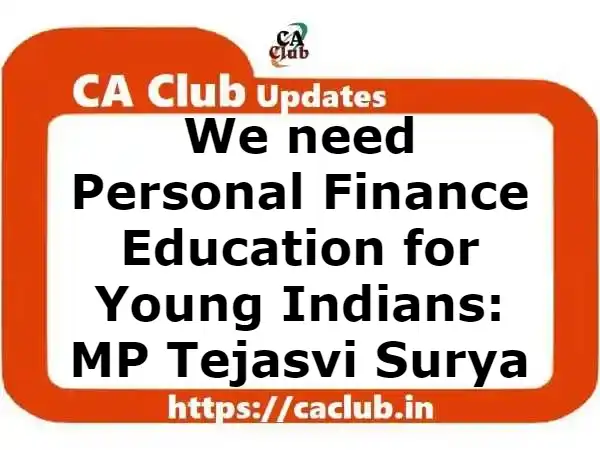MP Tejasvi Surya, has brought up an important issue in relation to the requirement that young people in India be educated in the fundamentals of personal finance. On social media, his proposal to incorporate these types of lessons into the curricula of schools and colleges has received a lot of positive feedback and approval.
It is possible to have a significant and beneficial effect on the well-being of young people in the here and now as well as in the future by educating them about the significance of sound financial planning and management. It is essential for young people to acquire an understanding of the fundamentals of personal finance in order to navigate the complexities of our modern economy. Financial literacy is an essential component of life skills, and it is essential that young people acquire this understanding.
The idea put forward by Member of Parliament Tejasvi Surya is a fantastic one, and it ought to be given serious consideration in order to ensure that today’s youth are equipped with the information and capabilities they’ll need to be successful in the future.
Why We Need To Teach Personal Finance?
The importance of teaching personal finance has grown in recent years as people struggle with higher levels of debt, but it is still a subject that is frequently ignored in school curricula. To prepare young people for the realities of life, financial literacy is crucial. For many, having this knowledge could mean the difference between success and failure, or even financial hardship. Early financial literacy education can empower people to make wise choices about their spending, saving, budgeting, and investing—decisions that will position them for a lifetime of financial success and stability. Let’s understand why it’s crucial to teach personal finance and how it can help people of all ages:
1. Financial literacy is a life skill for everyone
Financial literacy is an important life skill that should be taught to everyone. It is the understanding of how money works and how to make financial decisions that benefit one’s life and future. A lack of financial literacy has been linked to a variety of problems, including debt, overspending, and even bankruptcy. Teaching people the fundamentals of financial literacy, such as budgeting, saving, and investing, can help them make better financial decisions and improve their financial well-being. It is critical to begin teaching financial literacy at a young age so that individuals can develop the skills necessary to make sound financial decisions throughout their lives.
2. Empowering sound decision making on financial issues
Personal finance is an important aspect of life, but many people lack the skills and knowledge required to make sound financial decisions. Teaching people how to make wise financial decisions is critical to their success. We can empower people to make sound financial decisions by teaching them personal finance. For example, we can teach them the fundamentals of budgeting, investing, taxation, and debt reduction. People can make better financial decisions if they have this information.
3. Help people set and achieve financial goals
Personal finance education can assist people in setting and achieving financial goals. Many people want to buy a house, retire early, or start their own business, but they don’t know how to make their dreams a reality. People can create a plan to achieve their goals by learning about budgeting, saving, investing, and other financial strategies. People will be able to maximise their financial potential and achieve their dreams if they have a plan in place and the knowledge to stick to it.
4. Provide strategies on good habits of saving and budgeting
It is critical to teach people how to save and budget in order to develop good financial habits. Regular savings help to prepare for emergency situations and retirement, while budgeting ensures that all expenses are accounted for and that necessary expenses are prioritised over unnecessary ones. There are several strategies for saving and budgeting that can be used. To begin, people can set up automatic transfers from their deposit account to their savings, allowing them to save without having to think about it. Second, people can monitor their spending to ensure that they are staying within their budget. Third, people can create a budget and ensure that their income is allocated to the appropriate categories. Finally, people can identify areas where they can cut back their spending and use that money to save instead.
5. Build financial confidence and independence
Financial confidence and independence are important qualities to learn in any personal finance course. Individuals will be better equipped to make wise decisions about spending, saving, and investing if they are taught how to manage their own finances. Individuals must be equipped with the skills to make responsible financial decisions as well as the confidence to take risks when necessary. This can result in increased financial security, greater economic equality, and, eventually, financial freedom to pursue their dreams.
To summarise, we can say that teaching personal finance to young people in India is critical because it can help them understand the value of money, budget for their expenses, and plan for their future. Not only that, but it can also contributes to a healthier Indian economy by improving people’s ability to manage their money and make informed decisions. Teaching personal finance at a young age is critical for developing a generation of financially savvy seniors, which benefits both individuals and the economy as a whole.
